北师大版(2019)选择性必修第三册Unit 7 Careers Lesson 3 Meet the New Boss: You课件(共90张PPT)
文档属性
| 名称 | 北师大版(2019)选择性必修第三册Unit 7 Careers Lesson 3 Meet the New Boss: You课件(共90张PPT) | 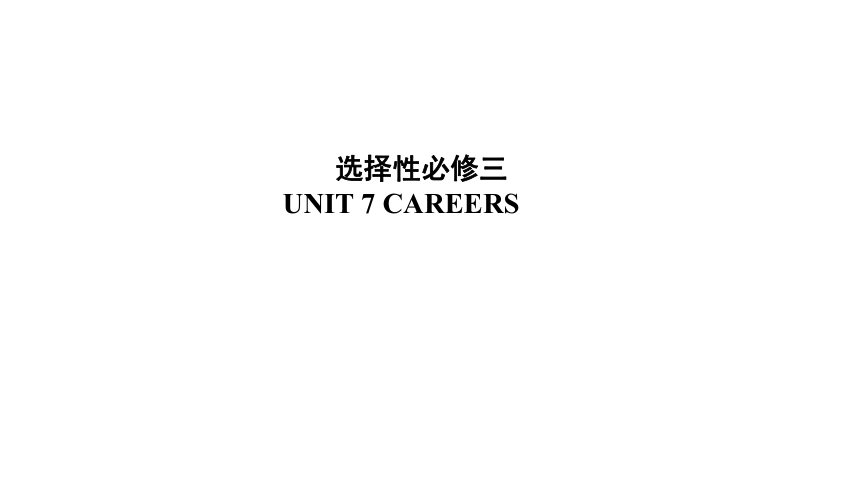 | |
| 格式 | pptx | ||
| 文件大小 | 1.6MB | ||
| 资源类型 | 教案 | ||
| 版本资源 | 北师大版(2019) | ||
| 科目 | 英语 | ||
| 更新时间 | 2022-11-05 17:10:07 | ||
图片预览

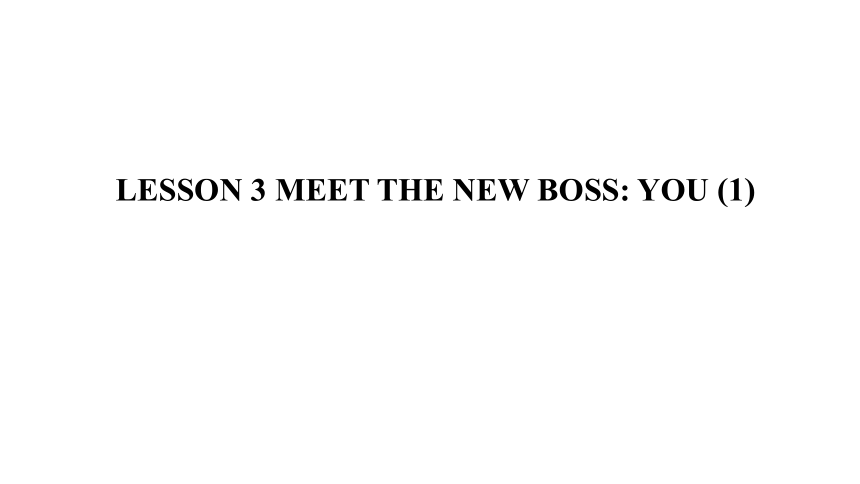


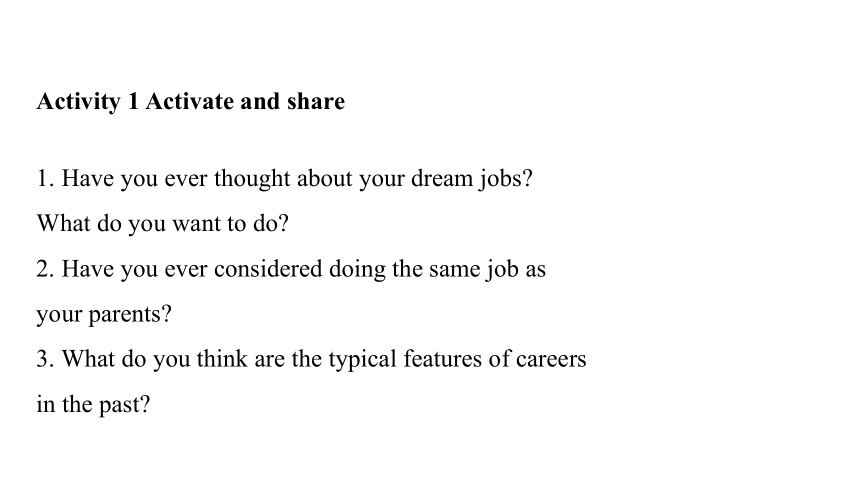
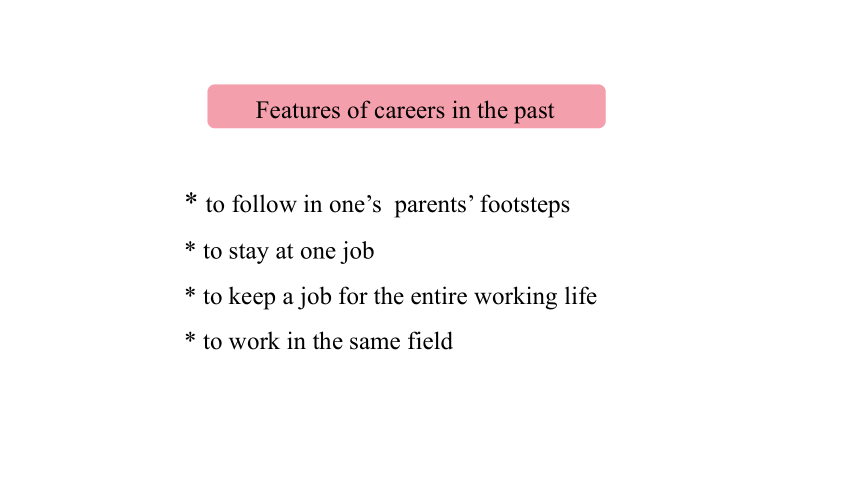


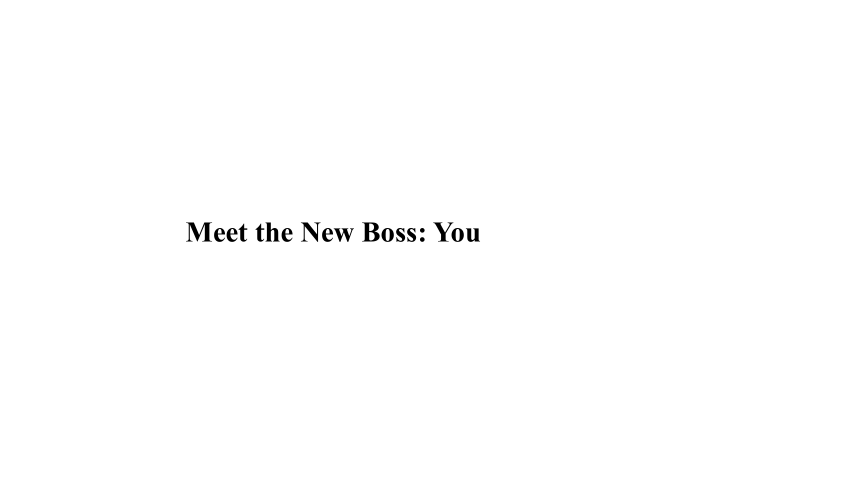
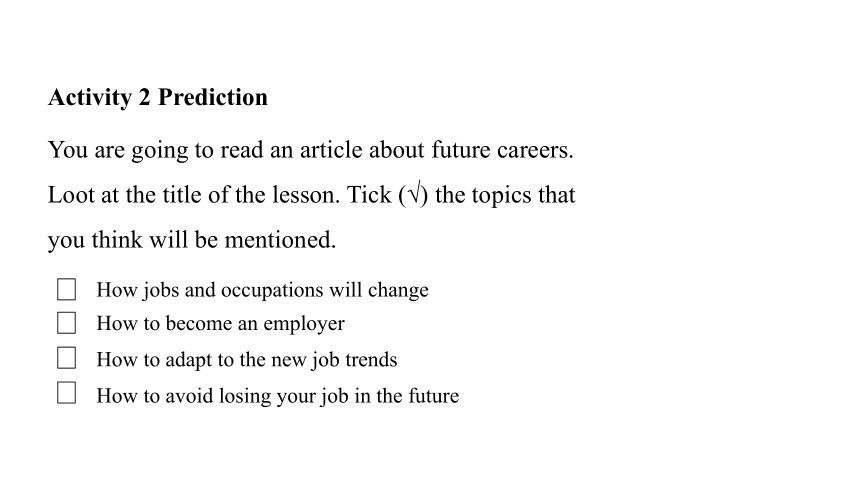

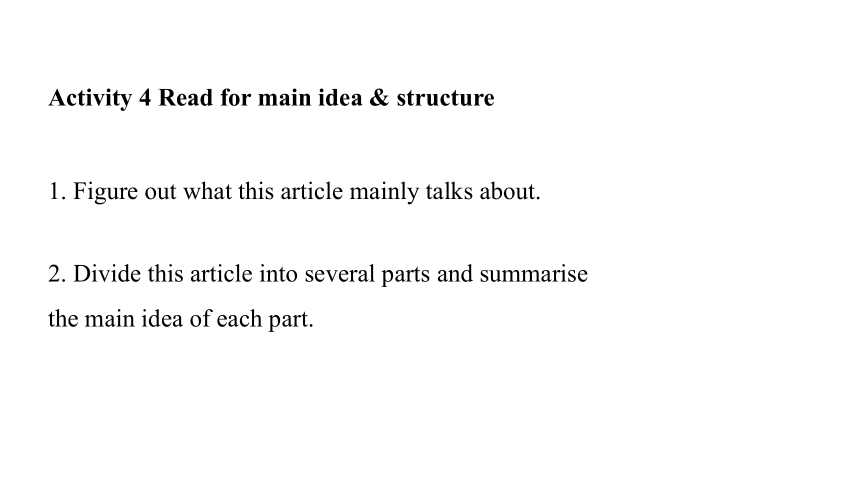
文档简介
(共90张PPT)
选择性必修三
UNIT 7 CAREERS (6)
LESSON 3 MEET THE NEW BOSS: YOU (1)
Be What You Wanna Be
doctor, actor, lawyer or a singer
why not president, be a dreamer
you can be just the one you wanna be
policeman, fire fighter or a post man
why not something like your old man
you can be just the one you wanna be
Activity 1 Activate and share
1. Have you ever thought about your dream jobs What do you want to do
2. Have you ever considered doing the same job as your parents
3. What do you think are the typical features of careers in the past
Features of careers in the past
* to follow in one’s parents’ footsteps
* to stay at one job
* to keep a job for the entire working life
* to work in the same field
What about in the future
Technology
Meet the New Boss: You
Activity 2 Prediction
You are going to read an article about future careers. Loot at the title of the lesson. Tick (√) the topics that you think will be mentioned.
How jobs and occupations will change
How to become an employer
How to adapt to the new job trends
How to avoid losing your job in the future
Activity 3 Read and check your prediction
How jobs and occupations will change
How to become an employer
How to adapt to the new job trends
How to avoid losing your job in the future
The article is mainly about:
√
√
Activity 4 Read for main idea & structure
1. Figure out what this article mainly talks about.
2. Divide this article into several parts and summarise the main idea of each part.
Activity 4 Read for main idea & structure
1. Figure out what this article mainly talks about.
The article mainly talks about how jobs and occupations will change in the future, and how to better adapt to the new job trends and become the boss of our own career.
Activity 4 Read for main idea & structure
2. Divide this article into several parts and summarise the main idea of each part.
Up till the 1980s, people in many countries regularly followed in their parents’ footsteps by working in the family business or joining the same profession as them. You’d follow your father to sea, onto the farm or into the workshop. You’d follow your mother into the kitchen or sewing room. /
Paragraph 1
In your grandparents’ time, there was the prospect of doing the same job from graduation until retirement. / How times have changed! Most people now have no intention of following in their parents’ footsteps or even staying at one job for very long. /
Part 1: “followed in their parents’ footsteps”
Part 2: “doing the same job”
Part 3: “have changed”
Key words of each part in paragraph 1:
The genre of the text:
Argumentation
In fact, planning to work in the same field or industry for your entire working life just isn’t practical anymore. One reason for this is technology. The skills you have now are unlikely to remain relevant and be enough to help you through your entire career. In fact, they will probably be out of date very soon.
Paragraph 2
And then what will you do Work hard Win the lottery Hope for the best You might be lucky. These strategies might bring you a nice, comfortable life: working at a job you like, earning a decent salary and retiring while you’re still young and healthy. But most of us today have to look beyond the little box called “career”.
Paragraph 2
be out of date: (adj.) old fashioned and no longer useful
过时了
lottery: A lottery is a type of gambling game in which people buy numbered tickets. Several numbers are then chosen, and the people who have those numbers on their tickets win a prize. 抽彩给奖法;碰运气的事
Paragraph 2 vocabulary
Paragraph 2 vocabulary
decent: of a good enough standard or quality
相当好的,像样的
e.g. a decent job, a decent place
retire: to stop doing your job, especially because you have reached a particular age or because you are ill/sick
e.g. She was forced to retire early from teaching because of ill health. (令)退职;(使)退休
If you think you can work eight hours a day and build a career, think again. You might be able to keep your job if you finish what you are asked to do, but this is hardly a recipe for greater career success. Instead, you’d better keep looking for smarter ways to do your work.
Paragraph 3
You’ll need to be a risk taker, an innovator, a problem solver, and a hard worker. Keep doing this, and you can become an expert or a specialist in something one day. You have a chance to choose to build a career, rather than being told to stay or to go.
Paragraph 3
Jobs and occupations come and go at an amazing pace these days. If you think you can’t be replaced by software, or your job can’t be outsourced to some robots on the moon, you are wrong. What if your job disappears after working for 10 years in the field
Paragraph 4
You may have to go back to the classroom and be retrained in order to qualify to work in another field. In fact, in all likelihood, you will have to do this multiple times. But you can be prepared for developments and changes before you’re thrown out of a career. It is entirely your choice to learn, or to be forced to learn.
Paragraph 4
In short, if you want to succeed in a 21st century career, you will have to develop new essential skills. Lifetime security from one employer is no longer certain or even likely. The truth is that you are the boss of your career, and it is up to you to decide what you can do and how well you can do it. Are you ready for this
Paragraph 5
outsource: to arrange for sb outside a company to do work or provide goods for that company 外包,外办
throw sb out: to force sb to leave a place 撵走,轰走
essential: completely necessary; extremely important in a particular situation or for a particular activity
极其重要的;最基本的
Paragraphs 4 & 5 vocabulary
Summary
Contrast between past and present jobs (Para. 1)
Jobs in the future and preparations required (Para. 2-4)
How to succeed in a 21st century career (Para. 5)
Activity 5 Read for details
Jobs in the past:s
Jobs in the future
How to succeed in a 21st century career.s
Wrong assumptions
Reasons
You should
Jobs in the past:
You could do the work your parents did.
Jobs in the future:
Wrong assumptions
Reasons
You should
You can work in the same field or industry for a long time.
Technology will change.
stay up to date with technology.
Jobs in the future:
Wrong assumptions
Reasons
You should
You can work eight hours a day and build a career.
It will not bring career success.
become an expert or a specialist in something.
Jobs in the future:
Wrong assumptions
Reasons
You should
You can’t be replaced by software, and your job can’t be outsourced to robots.
Jobs disappear.
be prepared for developments and changes before you are thrown out of a career.
Activity 6 Think and share
1. In paragraphs 2-4, the writer discusses some of the wrong assumptions. Why does the writer do this
2. Why does the writer think the “new boss” is you
Activity 6 Think and share
1. In paragraphs 2-4, the writer discusses some of the wrong assumptions. Why does the writer do this
The writer uses this way to emphasise what is wrong and invite readers to pay more attention to what he or she says about the real trend in the future.
Activity 6 Think and share
The writer discusses some of the wrong assumptions in order to make the readers reflect and realise that what common people think at present will no longer be true in the future and that they have no other choices but to walk out of their comfort zone and be their own boss.
Activity 6 Think and share
2. Why does the writer think the “new boss” is you
The author stated clearly at the end: If you want to succeed in a 21st century career, you will have to develop new essential skills. Lifetime security from one employer is no longer certain or even likely.
Activity 6 Think and share
The truth is that you are the boss of your career, and it is up to you to decide what you can do and how well you can do it. This means that you are responsible for your future.
Activity 7 Role-play interview
Suppose you are Eric, the Director of Human Resources in an international company. A local radio station wants to invite you to talk about jobs in the future and how we can adapt to the new job trends. Work in pairs and prepare for the radio program.
1 student as the interviewer
1 student as the director
(I: Interviewer D: Director)
I: Our radio station this week is on jobs, and we have invited the Director of Human Resources from an international company. Eric, thank you for coming.
D: Thanks for inviting me.
I: As far as I know, a lot of young people in our country have their own career plans. So would you please share your views on future jobs with us and give us some advice about how to adapt to the new job trends
D: Right. Because of the fast development of information technology, half of current jobs will be taken over by Artificial Intelligence within 15 years.
D: Therefore, planning to work in the same field or industry for your entire working life just isn’t practical anymore. As such, we’d better keep looking for smarter ways to do our work and develop new essential skills to be prepared for developments.
I: Thank you for sharing. Your advice is very helpful.
1. Adaptability and flexibility:
the skills that equip you for any challenge
2. Analytical skills:
the ability to make sense of data
3. Commercial awareness:
it is how the industry fits together
4. Communication skills:
the skill that sustains information flow
What should we do to adapt to the career changes
5. Creativity:
fresh thinking is of great importance
6. Emotional intelligence:
a secret ingredient for career success
7. Influencing skills:
inspiring confidence in others
8. Leadership and management:
prove you are more than an entry-level hire
…
What should we do to adapt to the career changes
Activity 8 Summary of the lesson
In this lesson, we have
1. talked and read about career trends from the past and for the future;
2. understood specific information and had critical thinking about new job trends.
Write a letter to help your classmate out
“A recent discussion with my parents drove me crazy. My father spent the whole night persuading me to follow in his footsteps and work at the bank. But my mother believed that I should explore a career on my own. What should I do ”
Li Ming
Homework
Write a letter to help your classmate Li Ming out.
Give your suggestions.
LESSON 3 MEET THE NEW BOSS: YOU (2)
Activity 1 Summarise the article
In the past, people in many countries regularly ________________________________ by working in the family business or ______________________ as them. However, changes have taken place since the 1980s.
Activity 1 Summarise the article
In the past, people in many countries regularly ________________________________ by working in the family business or ______________________ as them. However, changes have taken place since the 1980s.
followed in their parents’ footsteps
joining the same profession
Activity 1 Summarise the article
To start with, planning to work ________________________ for your entire working life isn’t practical any more. Besides, for great career success, it’s almost impossible for you _________________________ and build your career. Lastly, there is potential risk that your work can be replaced by software or some robots.
Activity 1 Summarise the article
To start with, planning to work ________________________ for your entire working life isn’t practical any more. Besides, for great career success, it’s almost impossible for you _________________________ and build your career. Lastly, there is potential risk that your work can be replaced by software or some robots.
in the same field or industry
to work eight hours a day
Activity 1 Summarise the article
All these changes require you _____________________________ if you want to succeed in a 21st century career.
Activity 1 Summarise the article
All these changes require you _____________________________ if you want to succeed in a 21st century career.
to develop new essential skills
Activity 2 Express yourself
* What jobs may be replaced by AI in the future
* What kind of jobs will be increasing in the next 10 years Have a prediction.
* How should we face the job trends
The first ten jobs that AI may replace: (prediction)
1. Sales and marketing researchers
2. Insurance adjusters
3. Security guards
4. Truck drivers
5. Consumer loan underwriters 消费者贷款担保人
The first ten jobs that AI may replace: (prediction)
6. Financial and sports journalists
7. Bookkeeper and financial analysts
8. Fruit pickers
9. Investment professionals
10. Radiologists 放射科医生
Top ten job roles in increasing: (prediction)
1. Data analysts and scientists
2. AI and machine learning specialists
3. Big data specialists
4. Digital marketing and strategy specialists
5. Process automation specialists
Top ten job roles in increasing: (prediction)
6. Information security analysts
7. Software and application developers
8. Internet of things specialists
9. Project managers
10. Database and network professionals
How should we face the job trends
AI is powerful and adaptable, but it can’t do everything that humans do. AI cannot create, conceptualize, do complex strategic planning, or undertake complex work that requires precise hand-eye coordination. AI cannot interact with humans “exactly like humans”, with empathy, human-human connection, and compassion.
How should we face the job trends
A new round of scientific, technological, and industrial revolutions are reshaping the world domain of innovation and global economic structure. The impact of science and technology on a country’s future and the people’s wellbeing has never been so profound as today.
How should we face the job trends
Therefore, we need to be a risk taker, an innovator, a problem solver, and a hard worker. And we are the boss of our career. It is up to us to decide what we can do and how well we can do it.
Activity 3 Collocations
What is collocation
A combination of words in a language that happens very often and more frequently than would happen by chance 词组,组合,搭配
Knowing collocation in English will help you predict the next word a speaker will say.
Activity 3 Collocations (P16, Ex. 6)
Find verbs in the article to complete the collocations.
1. ______________ in one’s parents’ footsteps
2. ______________ the same profession
3. ______________ the lottery
4. ______________ a decent salary
5. ______________ a career
6. ______________ new essential skills
Activity 3 Collocations (P16, Ex. 6)
Find verbs in the article to complete the collocations.
1. ______________ in one’s parents’ footsteps
2. ______________ the same profession
3. ______________ the lottery
4. ______________ a decent salary
5. ______________ a career
6. ______________ new essential skills
win
join
follow
earn
build
develop
Activity 4 Complete the sentences (P16, Ex. 6)
1. John ____________________________ and became a sailor.
2. Mary is determined to ___________________ in banking after she graduates from university.
3. You have to ________________________ to stand out in the competitive job market.
Activity 4 Complete the sentences (P16, Ex. 6)
1. John ____________________________ and became a sailor.
2. Mary is determined to ___________________ in banking after she graduates from university.
3. You have to ________________________ to stand out in the competitive job market.
followed in his father’s footsteps
build a career
develop new essential skills
Activity 4 Complete the sentences (P16, Ex. 6)
4. You must keep learning and work hard, instead of daydreaming to ________________.
5. He _________________ of $200,000 a year.
6. Tom _________________________ as his mother to become a teacher.
Activity 4 Complete the sentences (P16, Ex. 6)
4. You must keep learning and work hard, instead of daydreaming to ________________.
5. He _________________ of $200,000 a year.
6. Tom _________________________ as his mother to become a teacher.
win the lottery
earns a decent salary
joined the same profession
Activity 5 Negative expressions
When we want to say that something is not true or is not the case, we can use negative words, phrases or clauses. Negation can happen in a number of ways, most commonly, when we use a negative word such as no, not, never, none, nobody, etc.
Activity 5 Negative expressions
unlikely to be: probably not going to happen 不太可能
have no intention of: have no plan to do 无意做
not… anymore: not any longer 不再
no longer: used to say that something that was possible or true before, is not now 不再,不复
hardly: almost no, almost not, almost none 几乎不
Activity 5 Negative expressions
unlikely to be: probably not going to happen
e.g. The project seemed unlikely to succeed.
这个项目似乎很难成功。
Note:
we can also make negative meaning using prefixes (e.g. de-, dis-, un-): disrespectful, and suffixes (-less): useless, etc.
Activity 5 Negative expressions
have no intention of : have no plan to do
-have no intention of doing sth
-have no intention to do sth
e.g. I have no intention of going to the wedding.
我无意去参加婚礼。
Activity 5 Negative expressions
hardly: almost no; almost not; almost none
几乎不;几乎没有
e.g. There’s hardly any tea left.
没有剩什么茶了。
e.g. She hardly ever calls me (=almost never).
她几乎从来未给我打过电话。
1. High grades are _____________ enough to guarantee success in a career.
2. Keeping the same job for life is ______________ a realistic expectation __________________.
3. The job you have today is _________________
the same as the job you’ll have in 20 years’ time.
Activity 5 Negative expressions
1. High grades are _____________ enough to guarantee success in a career.
2. Keeping the same job for life is ______________ a realistic expectation __________________.
3. The job you have today is _________________
the same as the job you’ll have in 20 years’ time.
Activity 5 Negative expressions
unlikely to be
not
anymore
no longer
4. It’s _____________ surprising he lost his job: he was always late and never met his deadlines.
5. The company_________________ hiring more staff because it can use robots to do the work instead.
Activity 5 Negative expressions
4. It’s _____________ surprising he lost his job: he was always late and never met his deadlines.
5. The company_________________ hiring more staff because it can use robots to do the work instead.
Activity 5 Negative expressions
hardly
has no intention of
Activity 6 Recognising irony
What is irony
1. The amusing or strange aspect of a situation that is very different from what you expect.
(出乎意料的)奇异可笑之处;有讽刺意味的情况
2. The use of words that say the opposite of what you really mean, often as a joke and with a tone of voice that shows this. 反语,反话
Activity 6 Recognising irony
There are three types of irony in the literary genre.
1. Verbal irony (词语反语)
2. Situational irony (情境反语)
3. Dramatic irony (戏剧性反语)
1. Verbal irony
Verbal irony is when a character says something that is different from what they really mean or how they really feel. If the intent of the irony is to mock, it is known as sarcasm(讽刺;挖苦). Socratic irony (苏格拉底式反讽) is a type of verbal irony, where a person feigns ignorance in order to entice (诱使;引诱) someone else to make claims that can then be argued with.
Example of verbal irony:
Verbal irony would occur if a character walked out into a horrible blizzard (暴风雪) and said, “What nice weather we’re having!”
指说话人利用词汇、语法手段表示明显的反义,即用同本意相反的词语表达本意。
2. Situational irony
Situational irony occurs when there is a difference between what is expected to happen and what actually happens. For example, a fire station (消防站) burning down is a case of situational irony.
情境反语也称境遇反语或命运嘲弄,指的是结果与预料或期待相反的一种事态的发展。
Example of situational irony:
If a police officer was conducting a gun safety course and accidentally shot himself in the foot during the class, that would be situational irony.
3. Dramatic irony
Dramatic irony is when the audience knows more than the characters. The characters’ actions have a different meaning for them than they do for the audience, which creates tension (紧张气氛) and suspense (悬念). When used in tragedies (悲剧作品), dramatic irony is referred to as “tragic irony” (悲剧性反语).
Example of dramatic irony:
Shakespeare often made good use of irony in his literary works, and the ending of Romeo and Juliet is an embodiment (典型) of dramatic irony; the audience knows that both lovers are alive, but neither of the lovers knows that the other is still alive. Each character drinks their poison without knowing what the audience knows.
Activity 6 Recognising irony
Writers sometimes use irony (sarcasm (讽刺;嘲讽), exaggeration (夸张;夸大), and humour (幽默) ). We can infer that he/she is not serious and wants to draw the reader’s attention. Tick the sentences that show irony. Then discuss your answers.
Activity 6 Recognising irony
You might be lucky. These strategies might bring you a nice, comfortable life…
But most of us today have to look beyond the little box called “career”.
If you think you can work eight hours a day and build a career, think again.
If you think you can’t be replaced by software or your job can’t be outsourced to some robots on the moon, you are wrong.
Activity 6 Recognising irony
√
You might be lucky. These strategies might bring you a nice, comfortable life…
√
√
But most of us today have to look beyond the little box called “career”.
If you think you can work eight hours a day and build a career, think again.
If you think you can’t be replaced by software or your job can’t be outsourced to some robots on the moon, you are wrong.
Homework
Write a short passage about one job that you would like to do, and state how you will get prepared for that job.
选择性必修三
UNIT 7 CAREERS (6)
LESSON 3 MEET THE NEW BOSS: YOU (1)
Be What You Wanna Be
doctor, actor, lawyer or a singer
why not president, be a dreamer
you can be just the one you wanna be
policeman, fire fighter or a post man
why not something like your old man
you can be just the one you wanna be
Activity 1 Activate and share
1. Have you ever thought about your dream jobs What do you want to do
2. Have you ever considered doing the same job as your parents
3. What do you think are the typical features of careers in the past
Features of careers in the past
* to follow in one’s parents’ footsteps
* to stay at one job
* to keep a job for the entire working life
* to work in the same field
What about in the future
Technology
Meet the New Boss: You
Activity 2 Prediction
You are going to read an article about future careers. Loot at the title of the lesson. Tick (√) the topics that you think will be mentioned.
How jobs and occupations will change
How to become an employer
How to adapt to the new job trends
How to avoid losing your job in the future
Activity 3 Read and check your prediction
How jobs and occupations will change
How to become an employer
How to adapt to the new job trends
How to avoid losing your job in the future
The article is mainly about:
√
√
Activity 4 Read for main idea & structure
1. Figure out what this article mainly talks about.
2. Divide this article into several parts and summarise the main idea of each part.
Activity 4 Read for main idea & structure
1. Figure out what this article mainly talks about.
The article mainly talks about how jobs and occupations will change in the future, and how to better adapt to the new job trends and become the boss of our own career.
Activity 4 Read for main idea & structure
2. Divide this article into several parts and summarise the main idea of each part.
Up till the 1980s, people in many countries regularly followed in their parents’ footsteps by working in the family business or joining the same profession as them. You’d follow your father to sea, onto the farm or into the workshop. You’d follow your mother into the kitchen or sewing room. /
Paragraph 1
In your grandparents’ time, there was the prospect of doing the same job from graduation until retirement. / How times have changed! Most people now have no intention of following in their parents’ footsteps or even staying at one job for very long. /
Part 1: “followed in their parents’ footsteps”
Part 2: “doing the same job”
Part 3: “have changed”
Key words of each part in paragraph 1:
The genre of the text:
Argumentation
In fact, planning to work in the same field or industry for your entire working life just isn’t practical anymore. One reason for this is technology. The skills you have now are unlikely to remain relevant and be enough to help you through your entire career. In fact, they will probably be out of date very soon.
Paragraph 2
And then what will you do Work hard Win the lottery Hope for the best You might be lucky. These strategies might bring you a nice, comfortable life: working at a job you like, earning a decent salary and retiring while you’re still young and healthy. But most of us today have to look beyond the little box called “career”.
Paragraph 2
be out of date: (adj.) old fashioned and no longer useful
过时了
lottery: A lottery is a type of gambling game in which people buy numbered tickets. Several numbers are then chosen, and the people who have those numbers on their tickets win a prize. 抽彩给奖法;碰运气的事
Paragraph 2 vocabulary
Paragraph 2 vocabulary
decent: of a good enough standard or quality
相当好的,像样的
e.g. a decent job, a decent place
retire: to stop doing your job, especially because you have reached a particular age or because you are ill/sick
e.g. She was forced to retire early from teaching because of ill health. (令)退职;(使)退休
If you think you can work eight hours a day and build a career, think again. You might be able to keep your job if you finish what you are asked to do, but this is hardly a recipe for greater career success. Instead, you’d better keep looking for smarter ways to do your work.
Paragraph 3
You’ll need to be a risk taker, an innovator, a problem solver, and a hard worker. Keep doing this, and you can become an expert or a specialist in something one day. You have a chance to choose to build a career, rather than being told to stay or to go.
Paragraph 3
Jobs and occupations come and go at an amazing pace these days. If you think you can’t be replaced by software, or your job can’t be outsourced to some robots on the moon, you are wrong. What if your job disappears after working for 10 years in the field
Paragraph 4
You may have to go back to the classroom and be retrained in order to qualify to work in another field. In fact, in all likelihood, you will have to do this multiple times. But you can be prepared for developments and changes before you’re thrown out of a career. It is entirely your choice to learn, or to be forced to learn.
Paragraph 4
In short, if you want to succeed in a 21st century career, you will have to develop new essential skills. Lifetime security from one employer is no longer certain or even likely. The truth is that you are the boss of your career, and it is up to you to decide what you can do and how well you can do it. Are you ready for this
Paragraph 5
outsource: to arrange for sb outside a company to do work or provide goods for that company 外包,外办
throw sb out: to force sb to leave a place 撵走,轰走
essential: completely necessary; extremely important in a particular situation or for a particular activity
极其重要的;最基本的
Paragraphs 4 & 5 vocabulary
Summary
Contrast between past and present jobs (Para. 1)
Jobs in the future and preparations required (Para. 2-4)
How to succeed in a 21st century career (Para. 5)
Activity 5 Read for details
Jobs in the past:s
Jobs in the future
How to succeed in a 21st century career.s
Wrong assumptions
Reasons
You should
Jobs in the past:
You could do the work your parents did.
Jobs in the future:
Wrong assumptions
Reasons
You should
You can work in the same field or industry for a long time.
Technology will change.
stay up to date with technology.
Jobs in the future:
Wrong assumptions
Reasons
You should
You can work eight hours a day and build a career.
It will not bring career success.
become an expert or a specialist in something.
Jobs in the future:
Wrong assumptions
Reasons
You should
You can’t be replaced by software, and your job can’t be outsourced to robots.
Jobs disappear.
be prepared for developments and changes before you are thrown out of a career.
Activity 6 Think and share
1. In paragraphs 2-4, the writer discusses some of the wrong assumptions. Why does the writer do this
2. Why does the writer think the “new boss” is you
Activity 6 Think and share
1. In paragraphs 2-4, the writer discusses some of the wrong assumptions. Why does the writer do this
The writer uses this way to emphasise what is wrong and invite readers to pay more attention to what he or she says about the real trend in the future.
Activity 6 Think and share
The writer discusses some of the wrong assumptions in order to make the readers reflect and realise that what common people think at present will no longer be true in the future and that they have no other choices but to walk out of their comfort zone and be their own boss.
Activity 6 Think and share
2. Why does the writer think the “new boss” is you
The author stated clearly at the end: If you want to succeed in a 21st century career, you will have to develop new essential skills. Lifetime security from one employer is no longer certain or even likely.
Activity 6 Think and share
The truth is that you are the boss of your career, and it is up to you to decide what you can do and how well you can do it. This means that you are responsible for your future.
Activity 7 Role-play interview
Suppose you are Eric, the Director of Human Resources in an international company. A local radio station wants to invite you to talk about jobs in the future and how we can adapt to the new job trends. Work in pairs and prepare for the radio program.
1 student as the interviewer
1 student as the director
(I: Interviewer D: Director)
I: Our radio station this week is on jobs, and we have invited the Director of Human Resources from an international company. Eric, thank you for coming.
D: Thanks for inviting me.
I: As far as I know, a lot of young people in our country have their own career plans. So would you please share your views on future jobs with us and give us some advice about how to adapt to the new job trends
D: Right. Because of the fast development of information technology, half of current jobs will be taken over by Artificial Intelligence within 15 years.
D: Therefore, planning to work in the same field or industry for your entire working life just isn’t practical anymore. As such, we’d better keep looking for smarter ways to do our work and develop new essential skills to be prepared for developments.
I: Thank you for sharing. Your advice is very helpful.
1. Adaptability and flexibility:
the skills that equip you for any challenge
2. Analytical skills:
the ability to make sense of data
3. Commercial awareness:
it is how the industry fits together
4. Communication skills:
the skill that sustains information flow
What should we do to adapt to the career changes
5. Creativity:
fresh thinking is of great importance
6. Emotional intelligence:
a secret ingredient for career success
7. Influencing skills:
inspiring confidence in others
8. Leadership and management:
prove you are more than an entry-level hire
…
What should we do to adapt to the career changes
Activity 8 Summary of the lesson
In this lesson, we have
1. talked and read about career trends from the past and for the future;
2. understood specific information and had critical thinking about new job trends.
Write a letter to help your classmate out
“A recent discussion with my parents drove me crazy. My father spent the whole night persuading me to follow in his footsteps and work at the bank. But my mother believed that I should explore a career on my own. What should I do ”
Li Ming
Homework
Write a letter to help your classmate Li Ming out.
Give your suggestions.
LESSON 3 MEET THE NEW BOSS: YOU (2)
Activity 1 Summarise the article
In the past, people in many countries regularly ________________________________ by working in the family business or ______________________ as them. However, changes have taken place since the 1980s.
Activity 1 Summarise the article
In the past, people in many countries regularly ________________________________ by working in the family business or ______________________ as them. However, changes have taken place since the 1980s.
followed in their parents’ footsteps
joining the same profession
Activity 1 Summarise the article
To start with, planning to work ________________________ for your entire working life isn’t practical any more. Besides, for great career success, it’s almost impossible for you _________________________ and build your career. Lastly, there is potential risk that your work can be replaced by software or some robots.
Activity 1 Summarise the article
To start with, planning to work ________________________ for your entire working life isn’t practical any more. Besides, for great career success, it’s almost impossible for you _________________________ and build your career. Lastly, there is potential risk that your work can be replaced by software or some robots.
in the same field or industry
to work eight hours a day
Activity 1 Summarise the article
All these changes require you _____________________________ if you want to succeed in a 21st century career.
Activity 1 Summarise the article
All these changes require you _____________________________ if you want to succeed in a 21st century career.
to develop new essential skills
Activity 2 Express yourself
* What jobs may be replaced by AI in the future
* What kind of jobs will be increasing in the next 10 years Have a prediction.
* How should we face the job trends
The first ten jobs that AI may replace: (prediction)
1. Sales and marketing researchers
2. Insurance adjusters
3. Security guards
4. Truck drivers
5. Consumer loan underwriters 消费者贷款担保人
The first ten jobs that AI may replace: (prediction)
6. Financial and sports journalists
7. Bookkeeper and financial analysts
8. Fruit pickers
9. Investment professionals
10. Radiologists 放射科医生
Top ten job roles in increasing: (prediction)
1. Data analysts and scientists
2. AI and machine learning specialists
3. Big data specialists
4. Digital marketing and strategy specialists
5. Process automation specialists
Top ten job roles in increasing: (prediction)
6. Information security analysts
7. Software and application developers
8. Internet of things specialists
9. Project managers
10. Database and network professionals
How should we face the job trends
AI is powerful and adaptable, but it can’t do everything that humans do. AI cannot create, conceptualize, do complex strategic planning, or undertake complex work that requires precise hand-eye coordination. AI cannot interact with humans “exactly like humans”, with empathy, human-human connection, and compassion.
How should we face the job trends
A new round of scientific, technological, and industrial revolutions are reshaping the world domain of innovation and global economic structure. The impact of science and technology on a country’s future and the people’s wellbeing has never been so profound as today.
How should we face the job trends
Therefore, we need to be a risk taker, an innovator, a problem solver, and a hard worker. And we are the boss of our career. It is up to us to decide what we can do and how well we can do it.
Activity 3 Collocations
What is collocation
A combination of words in a language that happens very often and more frequently than would happen by chance 词组,组合,搭配
Knowing collocation in English will help you predict the next word a speaker will say.
Activity 3 Collocations (P16, Ex. 6)
Find verbs in the article to complete the collocations.
1. ______________ in one’s parents’ footsteps
2. ______________ the same profession
3. ______________ the lottery
4. ______________ a decent salary
5. ______________ a career
6. ______________ new essential skills
Activity 3 Collocations (P16, Ex. 6)
Find verbs in the article to complete the collocations.
1. ______________ in one’s parents’ footsteps
2. ______________ the same profession
3. ______________ the lottery
4. ______________ a decent salary
5. ______________ a career
6. ______________ new essential skills
win
join
follow
earn
build
develop
Activity 4 Complete the sentences (P16, Ex. 6)
1. John ____________________________ and became a sailor.
2. Mary is determined to ___________________ in banking after she graduates from university.
3. You have to ________________________ to stand out in the competitive job market.
Activity 4 Complete the sentences (P16, Ex. 6)
1. John ____________________________ and became a sailor.
2. Mary is determined to ___________________ in banking after she graduates from university.
3. You have to ________________________ to stand out in the competitive job market.
followed in his father’s footsteps
build a career
develop new essential skills
Activity 4 Complete the sentences (P16, Ex. 6)
4. You must keep learning and work hard, instead of daydreaming to ________________.
5. He _________________ of $200,000 a year.
6. Tom _________________________ as his mother to become a teacher.
Activity 4 Complete the sentences (P16, Ex. 6)
4. You must keep learning and work hard, instead of daydreaming to ________________.
5. He _________________ of $200,000 a year.
6. Tom _________________________ as his mother to become a teacher.
win the lottery
earns a decent salary
joined the same profession
Activity 5 Negative expressions
When we want to say that something is not true or is not the case, we can use negative words, phrases or clauses. Negation can happen in a number of ways, most commonly, when we use a negative word such as no, not, never, none, nobody, etc.
Activity 5 Negative expressions
unlikely to be: probably not going to happen 不太可能
have no intention of: have no plan to do 无意做
not… anymore: not any longer 不再
no longer: used to say that something that was possible or true before, is not now 不再,不复
hardly: almost no, almost not, almost none 几乎不
Activity 5 Negative expressions
unlikely to be: probably not going to happen
e.g. The project seemed unlikely to succeed.
这个项目似乎很难成功。
Note:
we can also make negative meaning using prefixes (e.g. de-, dis-, un-): disrespectful, and suffixes (-less): useless, etc.
Activity 5 Negative expressions
have no intention of : have no plan to do
-have no intention of doing sth
-have no intention to do sth
e.g. I have no intention of going to the wedding.
我无意去参加婚礼。
Activity 5 Negative expressions
hardly: almost no; almost not; almost none
几乎不;几乎没有
e.g. There’s hardly any tea left.
没有剩什么茶了。
e.g. She hardly ever calls me (=almost never).
她几乎从来未给我打过电话。
1. High grades are _____________ enough to guarantee success in a career.
2. Keeping the same job for life is ______________ a realistic expectation __________________.
3. The job you have today is _________________
the same as the job you’ll have in 20 years’ time.
Activity 5 Negative expressions
1. High grades are _____________ enough to guarantee success in a career.
2. Keeping the same job for life is ______________ a realistic expectation __________________.
3. The job you have today is _________________
the same as the job you’ll have in 20 years’ time.
Activity 5 Negative expressions
unlikely to be
not
anymore
no longer
4. It’s _____________ surprising he lost his job: he was always late and never met his deadlines.
5. The company_________________ hiring more staff because it can use robots to do the work instead.
Activity 5 Negative expressions
4. It’s _____________ surprising he lost his job: he was always late and never met his deadlines.
5. The company_________________ hiring more staff because it can use robots to do the work instead.
Activity 5 Negative expressions
hardly
has no intention of
Activity 6 Recognising irony
What is irony
1. The amusing or strange aspect of a situation that is very different from what you expect.
(出乎意料的)奇异可笑之处;有讽刺意味的情况
2. The use of words that say the opposite of what you really mean, often as a joke and with a tone of voice that shows this. 反语,反话
Activity 6 Recognising irony
There are three types of irony in the literary genre.
1. Verbal irony (词语反语)
2. Situational irony (情境反语)
3. Dramatic irony (戏剧性反语)
1. Verbal irony
Verbal irony is when a character says something that is different from what they really mean or how they really feel. If the intent of the irony is to mock, it is known as sarcasm(讽刺;挖苦). Socratic irony (苏格拉底式反讽) is a type of verbal irony, where a person feigns ignorance in order to entice (诱使;引诱) someone else to make claims that can then be argued with.
Example of verbal irony:
Verbal irony would occur if a character walked out into a horrible blizzard (暴风雪) and said, “What nice weather we’re having!”
指说话人利用词汇、语法手段表示明显的反义,即用同本意相反的词语表达本意。
2. Situational irony
Situational irony occurs when there is a difference between what is expected to happen and what actually happens. For example, a fire station (消防站) burning down is a case of situational irony.
情境反语也称境遇反语或命运嘲弄,指的是结果与预料或期待相反的一种事态的发展。
Example of situational irony:
If a police officer was conducting a gun safety course and accidentally shot himself in the foot during the class, that would be situational irony.
3. Dramatic irony
Dramatic irony is when the audience knows more than the characters. The characters’ actions have a different meaning for them than they do for the audience, which creates tension (紧张气氛) and suspense (悬念). When used in tragedies (悲剧作品), dramatic irony is referred to as “tragic irony” (悲剧性反语).
Example of dramatic irony:
Shakespeare often made good use of irony in his literary works, and the ending of Romeo and Juliet is an embodiment (典型) of dramatic irony; the audience knows that both lovers are alive, but neither of the lovers knows that the other is still alive. Each character drinks their poison without knowing what the audience knows.
Activity 6 Recognising irony
Writers sometimes use irony (sarcasm (讽刺;嘲讽), exaggeration (夸张;夸大), and humour (幽默) ). We can infer that he/she is not serious and wants to draw the reader’s attention. Tick the sentences that show irony. Then discuss your answers.
Activity 6 Recognising irony
You might be lucky. These strategies might bring you a nice, comfortable life…
But most of us today have to look beyond the little box called “career”.
If you think you can work eight hours a day and build a career, think again.
If you think you can’t be replaced by software or your job can’t be outsourced to some robots on the moon, you are wrong.
Activity 6 Recognising irony
√
You might be lucky. These strategies might bring you a nice, comfortable life…
√
√
But most of us today have to look beyond the little box called “career”.
If you think you can work eight hours a day and build a career, think again.
If you think you can’t be replaced by software or your job can’t be outsourced to some robots on the moon, you are wrong.
Homework
Write a short passage about one job that you would like to do, and state how you will get prepared for that job.
